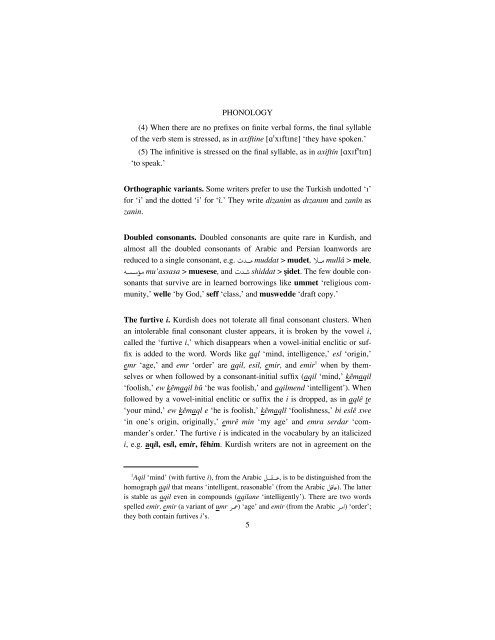You also want an ePaper? Increase the reach of your titles
YUMPU automatically turns print PDFs into web optimized ePapers that Google loves.
PHONOLOGY<br />
(4) When there are no prefixes on finite verbal forms, the final syllable<br />
of the verb stem is stressed, as in axíftine [A»xIftInE] ‘they have spoken.’<br />
(5) The infinitive is stressed on the final syllable, as in axiftín [AxIf»tIn]<br />
‘to speak.’<br />
Orthographic variants. Some writers prefer to use the Turkish undotted ‘ı’<br />
for ‘i’ and the dotted ‘i’ for ‘î.’ They write dizanim as dızanım and zanîn as<br />
zanin.<br />
Doubled consonants. Doubled consonants are quite rare in Kurdish, and<br />
almost all the doubled consonants of Arabic and Persian loanwords are<br />
reduced to a single consonant, e.g. تﺪـــﻣ muddat > mudet, ﻼـــﻣ mullâ > mele,<br />
ﻪـﺴﺳ ـ ﺆـﻣ<br />
mu’assasa > muesese, and تﺪـﺷ shiddat > şidet. The few double consonants<br />
that survive are in learned borrowings like ummet ‘religious community,’<br />
welle ‘by God,’ seff ‘class,’ and muswedde ‘draft copy.’<br />
The furtive i. Kurdish does not tolerate all final consonant clusters. When<br />
an intolerable final consonant cluster appears, it is broken by the vowel i,<br />
called the ‘furtive i,’ which disappears when a vowel-initial enclitic or suffix<br />
is added to the word. Words like aql ‘mind, intelligence,’ esl ‘origin,’<br />
emr ‘age,’ and emr ‘order’ are aqil, esil, emir, and emir 1 when by themselves<br />
or when followed by a consonant-initial suffix (aqil ‘mind,’ kêmaqil<br />
‘foolish,’ ew kêmaqil bû ‘he was foolish,’ and aqilmend ‘intelligent’). When<br />
followed by a vowel-initial enclitic or suffix the i is dropped, as in aqlê te<br />
‘your mind,’ ew kêmaql e ‘he is foolish,’ kêmaqlî ‘foolishness,’ bi eslê xwe<br />
‘in one’s origin, originally,’ emrê min ‘my age’ and emra serdar ‘commander’s<br />
order.’ The furtive i is indicated in the vocabulary by an italicized<br />
i, e.g. aqil, esil, emir, fêhim. Kurdish writers are not in agreement on the<br />
1<br />
Aqil ‘mind’ (with furtive i), from the Arabic ﻞ ـــﻘـــﻋ, is to be distinguished from the<br />
homograph aqil that means ‘intelligent, reasonable’ (from the Arabic ﻞ ـﻗﺎـS).<br />
The latter<br />
is stable as aqil even in compounds (aqilane ‘intelligently’). There are two words<br />
spelled emir, emir (a variant of umr ﺮ ـﲻ)<br />
‘age’ and emir (from the Arabic ﺮ ـﻣا)<br />
‘order’;<br />
they both contain furtives i’s.<br />
5


